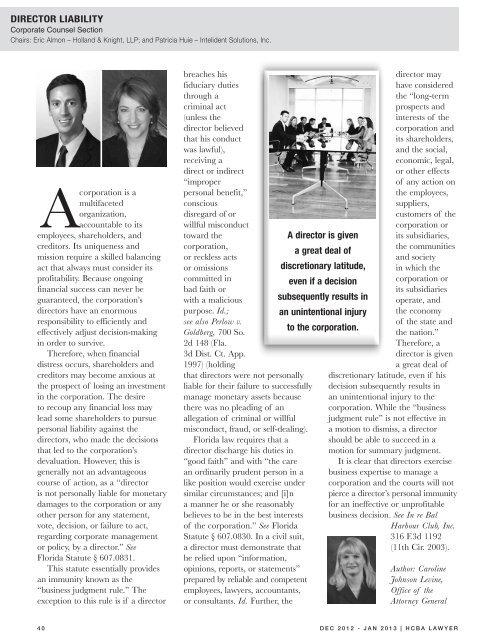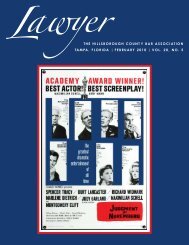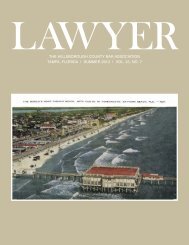december 2012 - Hillsborough County Bar Association
december 2012 - Hillsborough County Bar Association
december 2012 - Hillsborough County Bar Association
Create successful ePaper yourself
Turn your PDF publications into a flip-book with our unique Google optimized e-Paper software.
DIRECTOR LIABILITY<br />
Corporate Counsel Section<br />
Chairs: Eric Almon – Holland & Knight, LLP; and Patricia Huie – Intelident Solutions, Inc.<br />
Acorporation is a<br />
multifaceted<br />
organization,<br />
accountable to its<br />
employees, shareholders, and<br />
creditors. Its uniqueness and<br />
mission require a skilled balancing<br />
act that always must consider its<br />
profitability. Because ongoing<br />
financial success can never be<br />
guaranteed, the corporation’s<br />
directors have an enormous<br />
responsibility to efficiently and<br />
effectively adjust decision-making<br />
in order to survive.<br />
Therefore, when financial<br />
distress occurs, shareholders and<br />
creditors may become anxious at<br />
the prospect of losing an investment<br />
in the corporation. The desire<br />
to recoup any financial loss may<br />
lead some shareholders to pursue<br />
personal liability against the<br />
directors, who made the decisions<br />
that led to the corporation’s<br />
devaluation. However, this is<br />
generally not an advantageous<br />
course of action, as a “director<br />
is not personally liable for monetary<br />
damages to the corporation or any<br />
other person for any statement,<br />
vote, decision, or failure to act,<br />
regarding corporate management<br />
or policy, by a director.” See<br />
Florida Statute § 607.0831.<br />
This statute essentially provides<br />
an immunity known as the<br />
“business judgment rule.” The<br />
exception to this rule is if a director<br />
breaches his<br />
fiduciary duties<br />
through a<br />
criminal act<br />
(unless the<br />
director believed<br />
that his conduct<br />
was lawful),<br />
receiving a<br />
direct or indirect<br />
“improper<br />
personal benefit,”<br />
conscious<br />
disregard of or<br />
willful misconduct<br />
toward the<br />
corporation,<br />
or reckless acts<br />
or omissions<br />
committed in<br />
bad faith or<br />
with a malicious<br />
purpose. Id.;<br />
see also Perlow v.<br />
Goldberg, 700 So.<br />
2d 148 (Fla.<br />
3d Dist. Ct. App.<br />
1997) (holding<br />
that directors were not personally<br />
liable for their failure to successfully<br />
manage monetary assets because<br />
there was no pleading of an<br />
allegation of criminal or willful<br />
misconduct, fraud, or self-dealing).<br />
Florida law requires that a<br />
director discharge his duties in<br />
“good faith” and with “the care<br />
an ordinarily prudent person in a<br />
like position would exercise under<br />
similar circumstances; and [i]n<br />
a manner he or she reasonably<br />
believes to be in the best interests<br />
of the corporation.” See Florida<br />
Statute § 607.0830. In a civil suit,<br />
a director must demonstrate that<br />
he relied upon “information,<br />
opinions, reports, or statements”<br />
prepared by reliable and competent<br />
employees, lawyers, accountants,<br />
or consultants. Id. Further, the<br />
A director is given<br />
a great deal of<br />
discretionary latitude,<br />
even if a decision<br />
subsequently results in<br />
an unintentional injury<br />
to the corporation.<br />
director may<br />
have considered<br />
the “long-term<br />
prospects and<br />
interests of the<br />
corporation and<br />
its shareholders,<br />
and the social,<br />
economic, legal,<br />
or other effects<br />
of any action on<br />
the employees,<br />
suppliers,<br />
customers of the<br />
corporation or<br />
its subsidiaries,<br />
the communities<br />
and society<br />
in which the<br />
corporation or<br />
its subsidiaries<br />
operate, and<br />
the economy<br />
of the state and<br />
the nation.”<br />
Therefore, a<br />
director is given<br />
a great deal of<br />
discretionary latitude, even if his<br />
decision subsequently results in<br />
an unintentional injury to the<br />
corporation. While the “business<br />
judgment rule” is not effective in<br />
a motion to dismiss, a director<br />
should be able to succeed in a<br />
motion for summary judgment.<br />
It is clear that directors exercise<br />
business expertise to manage a<br />
corporation and the courts will not<br />
pierce a director’s personal immunity<br />
for an ineffective or unprofitable<br />
business decision. See In re Bal<br />
Harbour Club, Inc.<br />
316 F.3d 1192<br />
(11th Cir. 2003).<br />
Author: Caroline<br />
Johnson Levine,<br />
Office of the<br />
Attorney General<br />
40 DEC <strong>2012</strong> - JAN 2013 | HCBA LAWYER









